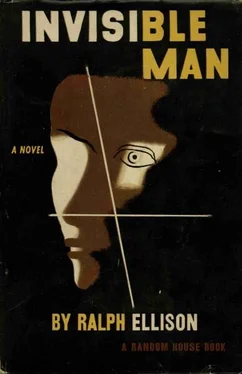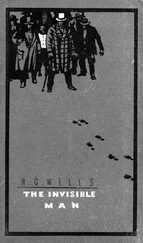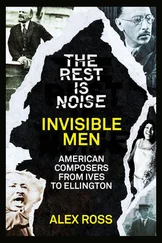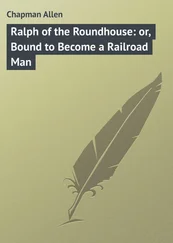Ralph Ellison - Invisible man
Здесь есть возможность читать онлайн «Ralph Ellison - Invisible man» весь текст электронной книги совершенно бесплатно (целиком полную версию без сокращений). В некоторых случаях можно слушать аудио, скачать через торрент в формате fb2 и присутствует краткое содержание. Год выпуска: 1995, ISBN: 1995, Издательство: Vintage Books, Жанр: Классическая проза, на английском языке. Описание произведения, (предисловие) а так же отзывы посетителей доступны на портале библиотеки ЛибКат.
- Название:Invisible man
- Автор:
- Издательство:Vintage Books
- Жанр:
- Год:1995
- ISBN:9780679732761
- Рейтинг книги:4 / 5. Голосов: 1
-
Избранное:Добавить в избранное
- Отзывы:
-
Ваша оценка:
- 80
- 1
- 2
- 3
- 4
- 5
Invisible man: краткое содержание, описание и аннотация
Предлагаем к чтению аннотацию, описание, краткое содержание или предисловие (зависит от того, что написал сам автор книги «Invisible man»). Если вы не нашли необходимую информацию о книге — напишите в комментариях, мы постараемся отыскать её.
The Waste Land,
Invisible man — читать онлайн бесплатно полную книгу (весь текст) целиком
Ниже представлен текст книги, разбитый по страницам. Система сохранения места последней прочитанной страницы, позволяет с удобством читать онлайн бесплатно книгу «Invisible man», без необходимости каждый раз заново искать на чём Вы остановились. Поставьте закладку, и сможете в любой момент перейти на страницу, на которой закончили чтение.
Интервал:
Закладка:
As we came to a side road I saw a team of oxen hitched to a broken-down wagon, the ragged driver dozing on the seat beneath the shade of a clump of trees.
"Did you see that, sir?" I asked over my shoulder.
"What was it?"
"The ox team, sir."
"Oh! No, I can't see it for the trees," he said looking back. "It's good timber."
"I'm sorry, sir. Shall I turn back?"
"No, it isn't much," he said. "Go on."
I drove on, remembering the lean, hungry face of the sleeping man. He was the kind of white man I feared. The brown fields swept out to the horizon. A flock of birds dipped down, circled, swung up and out as though linked by invisible strings. Waves of heat danced above the engine hood. The tires sang over the highway. Finally I overcame my timidity and asked him:
"Sir, why did you become interested in the school?"
"I think," he said, thoughtfully, raising his voice, "it was because I felt even as a young man that your people were somehow closely connected with my destiny. Do you understand?"
"Not so clearly, sir," I said, ashamed to admit it.
"You have studied Emerson, haven't you?"
"Emerson, sir?"
"Ralph Waldo Emerson."
I was embarrassed because I hadn't. "Not yet, sir. We haven't come to him yet."
"No?" he said with a note of surprise. "Well, never mind. I am a New Englander, like Emerson. You must learn about him, for he was important to your people. He had a hand in your destiny. Yes, perhaps that is what I mean. I had a feeling that your people were somehow connected with my destiny. That what happened to you was connected with what would happen to me ..."
I slowed the car, trying to understand. Through the glass I saw him gazing at the long ash of his cigar, holding it delicately in his slender, manicured fingers.
"Yes, you are my fate, young man. Only you can tell me what it really is. Do you understand?"
"I think I do, sir."
"I mean that upon you depends the outcome of the years I have spent in helping your school. That has been my life's work, not my banking or my researches, but my first-hand organizing of human life."
I saw him now, leaning toward the front seat, speaking with an intensity which had not been there before. It was hard not to turn my eyes from the highway and face him.
"There is another reason, a reason more important, more passionate and, yes, even more sacred than all the others," he said, no longer seeming to see me, but speaking to himself alone. "Yes, even more sacred than all the others. A girl, my daughter. She was a being more rare, more beautiful, purer, more perfect and more delicate than the wildest dream of a poet. I could never believe her to be my own flesh and blood. Her beauty was a well-spring of purest water-of-life, and to look upon her was to drink and drink and drink again ... She was rare, a perfect creation, a work of purest art. A delicate flower that bloomed in the liquid light of the moon. A nature not of this world, a personality like that of some biblical maiden, gracious and queenly. I found it difficult to believe her my own ..."
Suddenly he fumbled in his vest pocket and thrust something over the back of the seat, surprising me.
"Here, young man, you owe much of your good fortune in attending such a school to her."
I looked upon the tinted miniature framed in engraved platinum. I almost dropped it. A young woman of delicate, dreamy features looked up at me. She was very beautiful, I thought at the time, so beautiful that I did not know whether I should express admiration to the extent I felt it or merely act polite. And yet I seemed to remember her, or someone like her, in the past. I know now that it was the flowing costume of soft, flimsy material that made for the effect; today, dressed in one of the smart, well-tailored, angular, sterile, streamlined, engine-turned, air-conditioned modern outfits you see in the women's magazines, she would appear as ordinary as an expensive piece of machine-tooled jewelry and just as lifeless. Then, however, I shared something of his enthusiasm.
"She was too pure for life," he said sadly; "too pure and too good and too beautiful. We were sailing together, touring the world, just she and I, when she became ill in Italy. I thought little of it at the time and we continued across the Alps. When we reached Munich she was already fading away. While we were attending an embassy party she collapsed. The best medical science in the world could not save her. It was a lonely return, a bitter voyage. I have never recovered. I have never forgiven myself. Everything I've done since her passing has been a monument to her memory."
He became silent, looking with his blue eyes far beyond the field stretching away in the sun. I returned the miniature, wondering what in the world had made him open his heart to me. That was something I never did; it was dangerous. First, it was dangerous if you felt like that about anything, because then you'd never get it or something or someone would take it away from you; then it was dangerous because nobody would understand you and they'd only laugh and think you were crazy.
"So you see, young man, you are involved in my life quite intimately, even though you've never seen me before. You are bound to a great dream and to a beautiful monument. If you become a good farmer, a chef, a preacher, doctor, singer, mechanic -- whatever you become, and even if you fail, you are my fate. And you must write me and tell me the outcome."
I was relieved to see him smiling through the mirror. My feelings were mixed. Was he kidding me? Was he talking to me like someone in a book just to see how I would take it? Or could it be, I was almost afraid to think, that this rich man was just the tiniest bit crazy? How could I tell him his fate? He raised his head and our eyes met for an instant in the glass, then I lowered mine to the blazing white line that divided the highway.
The trees along the road were thick and tall. We took a curve. Flocks of quail sailed up and over a field, brown, brown, sailing down, blending.
"Will you promise to tell me my fate?" I heard.
"Sir?"
"Will you?"
"Right now, sir?" I asked with embarrassment.
"It is up to you. Now, if you like."
I was silent. His voice was serious, demanding. I could think of no reply. The motor purred. An insect crushed itself against the windshield, leaving a yellow, mucous smear.
"I don't know now, sir. This is only my junior year ..."
"But you'll tell me when you know?"
"I'll try, sir."
"Good."
When I took a quick glance into the mirror he was smiling again. I wanted to ask him if being rich and famous and helping to direct the school to become what it was, wasn't enough; but I was afraid.
"What do you think of my idea, young man?" he said.
"I don't know, sir. I only think that you have what you're looking for. Because if I fail or leave school, it doesn't seem to me it would be your fault. Because you helped make the school what it is."
"And you think that enough?"
"Yes, sir. That's what the president tells us. You have yours, and you got it yourself, and we have to lift ourselves up the same way."
"But that's only part of it, young man. I have wealth and a reputation and prestige -- all that is true. But your great Founder had more than that, he had tens of thousands of lives dependent upon his ideas and upon his actions. What he did affected your whole race. In a way, he had the power of a king, or in a sense, of a god. That, I've come to believe, is more important than my own work, because more depends upon you. You are important because if you fail I have failed by one individual, one defective cog; it didn't matter so much before, but now I'm growing old and it has become very important ..."
Читать дальшеИнтервал:
Закладка:
Похожие книги на «Invisible man»
Представляем Вашему вниманию похожие книги на «Invisible man» списком для выбора. Мы отобрали схожую по названию и смыслу литературу в надежде предоставить читателям больше вариантов отыскать новые, интересные, ещё непрочитанные произведения.
Обсуждение, отзывы о книге «Invisible man» и просто собственные мнения читателей. Оставьте ваши комментарии, напишите, что Вы думаете о произведении, его смысле или главных героях. Укажите что конкретно понравилось, а что нет, и почему Вы так считаете.











